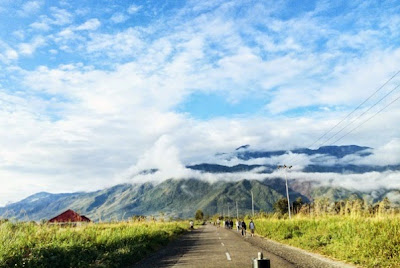 |
| The land is rich with breathtaking scenery, yet people face difficulties in meeting basic needs. (Courtesy of Kalyana Shira Films) |
In this beautiful and moving story of life in Papua, a mother lives in endless struggle while raising her four children.
Tanah Mama, or Mama’s Soil, is a 62-minute documentary by debut director Asrida Elisabeth that tells the story of one woman, Halosina, trying to feed four children in a highland hamlet in Wamena without her husband’s support.
With her husband, Hosea; Halosina originally lived in Huguma, about five hours away from Wamena by foot.
In Huguma, it is a husband’s duty to tend to prepare fields for their wives. Once the crops are ready, it is a wife’s job to grow vegetables and sell the harvest in markets to make ends meet.
Hosea, a polygamist with another wife and family, does not join the workforce in setting up the fields for Halosina, leaving her in uncertainty.
Without no money in her pocket, Halosina must pick yams from her sister-in-law’s field to feed her family.
The situation worsens as the sister-in-law, who owns the field along with some other women, considers Halosina’s act as theft, which costs Halosina Rp 1 million or one pig in fines.
Carrying too much of a burden on her shoulders, Halosina moves to the neighboring hamlet of Anjelma along with her children. The move is also a protest against Halosina’s husband, who does nothing to settle her problems.
One day, Hosea visits to talk over their problems.
For Halosina, it is the chance to address Hosea’s inability to provide her with a field — or to stand up for her over the stealing issue.
“All you can think of is just sex,” snaps Halosina to Hosea, referring to her husband’s polygamy, while neglecting their children.
Tanah Mama offers a bittersweet view of Papua.
The land is rich with breathtaking scenery, yet its people face difficulties in meeting their basic needs — from earning money, education and healthcare.
The documentary captures a glimpse of one woman’s struggle — the long walks from one place to another; poverty, as people sleep on thin mats placed over piles of hay in their honai houses; limited schools and expensive prices for everyday amenities.
The documentary also shows touching scenes: A scene where Halosina’s baby lightly hits one of his sleepy brothers with mineral water bottle, for example, will create smiles.
Revealing the story that takes place in her homeland, director Asrida says that the documentary was inspired by mothers who are busy selling their harvests at the markets.
“Originally, the culture in Wamena allowed men and women to work together in cultivation. The men, or husbands, are responsible for opening fields and making them ready to grow vegetables; while the women, or the wives, are responsible for planting, taking care of, harvesting and selling the vegetables in the markets,” she says.
However, economic development in Papua encourages men to spend more times in urban areas, leaving behind the custom of opening fields, which are the livelihoods of women, says Asrida.
Life gets tougher for the women in Papua as they don’t feel the government’s presence, she adds.
“A message that I’d like to address to the government is there are so many [unfortunate] things that happen in most places in Wamena. What have you guys done [in helping us out]?”
Producer Nia Dinata says that the documentary exposes the real stories of the women of Wamena in a simple, touching way.
“Papua has been part of Indonesia for so many years but [the documentary] shows that [most are] not doing well enough in understanding the Papuans. For me, [Halosina] is a different character — she’s brave and unique,” she adds.
The film is slated for limited release in Bandung, West Java; Jakarta and Yogyakarta on Jan. 8.
_______________
Tanah Mama
Director/writer: Asrida Elisabeth
Producer: Nia Dinata
Cinematographer: Vera Lestafa
Run time: 62 minutes
In Papuan with Indonesian and English subtitles
Source; www.thejakartapost.com









